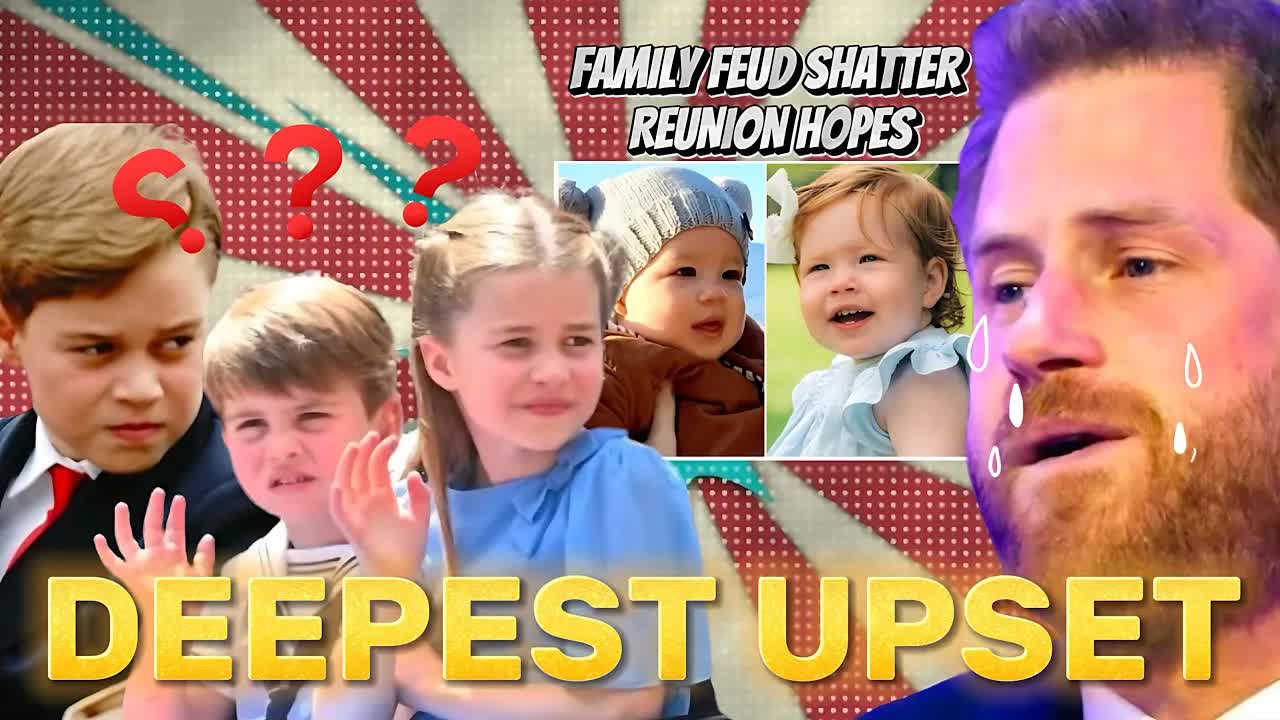Must Read
The Royal Rift: Prince Harry’s Struggles and the Impact on Family Ties
In a world where royal relationships once thrived, a significant fracture has emerged between Prince Harry and the British royal family.
This rift, steeped in years of tension, has left many questioning the cost of Harry's quest for independence.
What does this mean for his children, Archie and Lilibet?
As the drama unfolds, it becomes clear that the consequences of these choices are far-reaching, affecting not just Harry but the entire royal lineage.
Recent insights from royal expert Tom Quinn shed light on Harry's profound distress regarding the strained connections between his children and their royal cousins—Prince George, Prince Louis, and Princess Charlotte.
Despite hopes that the younger generation could bridge the familial gap, both Harry and Meghan appear to see no viable path toward reconciliation.
This ongoing feud is not just a personal struggle; it has implications for the next generation of royals.
The origins of this discord can be traced back to years of perceived neglect and mistreatment that Harry and Meghan felt from the royal institution and the media.
Long before stepping away from royal duties, Harry was vocal about his dissatisfaction with how he and his wife were treated.
The fallout from their candid interviews and public revelations has only deepened the divide, leaving Harry feeling unsupported during some of the most challenging times in his life.
Isolation has been a recurring theme in Harry and Meghan's narrative.
They have often claimed that the royal family did not provide the necessary support for Meghan, which led to feelings of alienation.
However, critics argue that much of what has been reported may have been exaggerated, casting doubt on the authenticity of their experiences.
The royal family, while attempting to shield them from the media frenzy, ultimately cannot control every narrative spun by the press.
Harry and Meghan's decision to sever ties with the royal family was driven by a desire for privacy and a more peaceful existence, rather than solely dissatisfaction with their relatives.
Yet, some observers perceive this move as one fueled by self-interest.
The reality remains that Harry's concerns about his children's relationships with their royal family members reflect a deeper struggle within himself—a struggle that seems to overlook the complexities of family dynamics.
It's hard not to wonder how Harry and Meghan envision their children's understanding of family.
Keeping Archie and Lilibet away from their extended family, except for Meghan's mother, inevitably shapes their perception of kinship.
How will they explain the royal legacy to their children?
The notion that Archie might be curious about his relatives living in palaces raises questions about how they frame their children's reality.
The narrative surrounding Harry and Meghan often paints them as victims, yet this perspective is met with skepticism.
Critics argue that Harry's actions over the past few years have contributed significantly to the rift, making it difficult to view him as a mere casualty of circumstance.
The absence of contact between the Sussex children and their royal cousins may actually serve the best interest of all parties involved, protecting them from the emotional turmoil that has characterized their parents' relationship.
As the royal family continues to navigate this turbulent landscape, it's evident that the dignity they've maintained through silence contrasts sharply with the drama unfolding in California.
The late Queen and Prince Philip bore witness to the strain, and now, royal commentators like Tom Quinn are attempting to frame Harry and Meghan's narrative in a sympathetic light.
But the question lingers: how long can this portrayal last?
Harry's ongoing grievances with the royal family raise eyebrows, especially considering the nature of his public statements.
Some might argue that if he truly valued family connections, he would reconsider his approach to the media and its representation of his loved ones.
After all, why would William and Catherine's children want to engage with someone who has publicly criticized their parents?
The complexities of this family feud extend beyond personal grievances.
Harry and Meghan's desire for acknowledgment and apologies clashes with the royal family's commitment to tradition and image preservation.
With each party holding steadfastly to their respective positions, the possibility of reconciliation seems increasingly remote.
As the dust settles, it becomes clearer that the royal family is thriving without the Sussexes.
Meanwhile, Harry appears to be grappling with the consequences of his decisions.
His fixation on ensuring his children have a connection to royalty raises questions about his motivations.
Is it truly about family, or is it a reflection of his own insecurities?
In the end, the future of Archie and Lilibet remains uncertain.
While Harry and Meghan may wish for their children to have royal ties, the reality is that their choices have created barriers that may be difficult to overcome.
As the royal family moves forward, it seems they are better off maintaining their distance from the tumultuous narrative that Harry and Meghan have crafted.
This ongoing saga serves as a reminder that the choices we make can have lasting impacts, not just on ourselves but also on those we hold dear.
As the story unfolds, one can only hope that healing and understanding will eventually prevail for all involved.








































